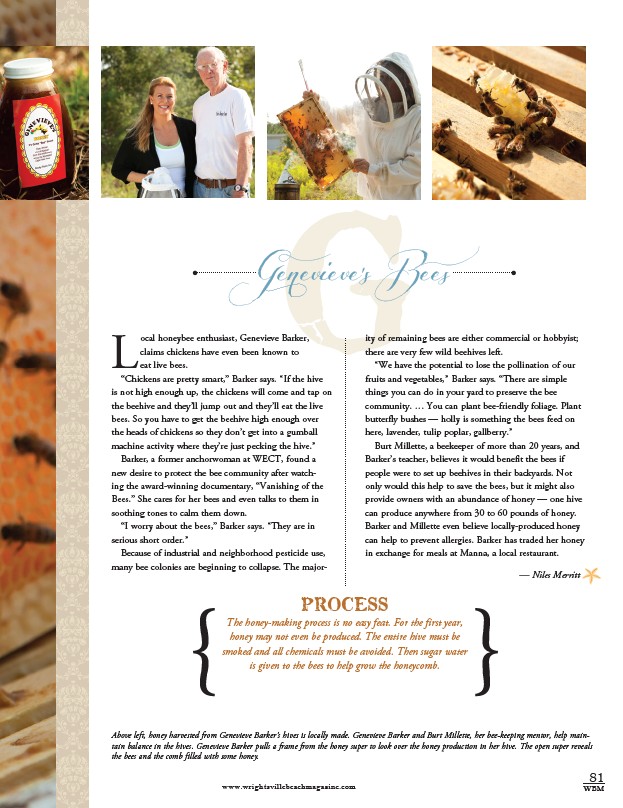
81
WBM
GeGnevieve’s Bees
Local honeybee enthusiast, Genevieve Barker,
claims chickens have even been known to
eat live bees.
“Chickens are pretty smart,” Barker says. “If the hive
is not high enough up, the chickens will come and tap on
the beehive and they’ll jump out and they’ll eat the live
bees. So you have to get the beehive high enough over
the heads of chickens so they don’t get into a gumball
machine activity where they’re just pecking the hive.”
Barker, a former anchorwoman at WECT, found a
new desire to protect the bee community after watch-ing
the award-winning documentary, “Vanishing of the
Bees.” She cares for her bees and even talks to them in
soothing tones to calm them down.
“I worry about the bees,” Barker says. “They are in
serious short order.”
Because of industrial and neighborhood pesticide use,
many bee colonies are beginning to collapse. The major-ity
of remaining bees are either commercial or hobbyist;
there are very few wild beehives left.
“We have the potential to lose the pollination of our
fruits and vegetables,” Barker says. “There are simple
things you can do in your yard to preserve the bee
community. … You can plant bee-friendly foliage. Plant
butterfly bushes — holly is something the bees feed on
here, lavender, tulip poplar, gallberry.”
Burt Millette, a beekeeper of more than 20 years, and
Barker’s teacher, believes it would benefit the bees if
people were to set up beehives in their backyards. Not
only would this help to save the bees, but it might also
provide owners with an abundance of honey — one hive
can produce anywhere from 30 to 60 pounds of honey.
Barker and Millette even believe locally-produced honey
can help to prevent allergies. Barker has traded her honey
in exchange for meals at Manna, a local restaurant.
— Niles Merritt
{ {
PROCESS
The honey-making process is no easy feat. For the first year,
honey may not even be produced. The entire hive must be
smoked and all chemicals must be avoided. Then sugar water
is given to the bees to help grow the honeycomb. Above left, honey harvested from Genevieve Barker’s hives is locally made. Genevieve Barker and Burt Millette, her bee-keeping mentor, help main-tain
balance in the hives. Genevieve Barker pulls a frame from the honey super to look over the honey production in her hive. The open super reveals
the bees and the comb filled with some honey.
www.wrightsvillebeachmagazine.com